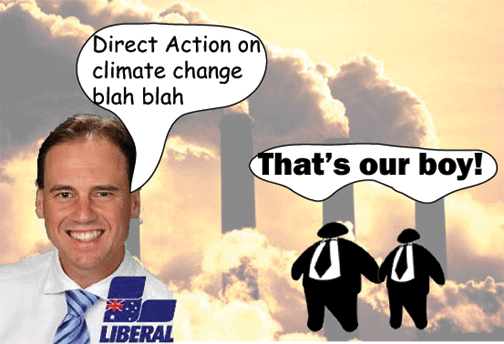Search
Democracy Links
Member's Off-site Blogs
in search of invisibles ....

from politicoz ….
Tony Abbott has been quiet since his statements about a 'so-called market' on invisible substances, but Coalition spokesmen Greg Hunt and Joe Hockey have been doing the media rounds, painting the government's move as "a complete con, a complete fix, a complete fiddle".
So how does Coalition policy stack up? Latika Bourke (ABC) attempted to find out, and her interview with Greg Hunt is worth watching in its entirety.
What's the equivalent cost of carbon per tonne under Direct Action? she asked.
"Well it will be directed by the market and it is likely to be very strongly informed by events overseas." (She was too polite to ask if this was the same 'so-called market' that Abbott referred to earlier.)
What will be the expected cost range? "We actually believe it will be very low, we will be guided by the market..."
"How low?"
"Well actually the market will determine... what we do is cap costs."
There was no explanation of how the Direct Action plan's $3.2 billion related to the promised emissions reduction of 5% by 2020, and no sense that these sums had even been attempted.
Businesses that emit over a baseline will be fined under Direct Action, Bourke reminded viewers. What circumstances would prompt penalties?
"We are," Hunt said, "budgeting zero revenue."
Bourke asked about the planting of twenty million trees on public land – how much will it cost?
Has the Coalition identified the available land? What will be the contribution to the emissions reduction target? No clear response.
The Coalition has also placed a heavy emphasis on soil carbon technologies to reduce emissions.
But the first published review of the science on the sequestration of soil carbon in Australia, announced this morning, says the potential is actually "very limited and not likely to be effective".
One of the Coalition's key electoral advantages is suddenly looking like a liability.
- By John Richardson at 17 Jul 2013 - 9:20pm
- John Richardson's blog
- Login or register to post comments
Recent comments
39 min 19 sec ago
52 min 9 sec ago
1 hour 52 sec ago
1 hour 16 min ago
2 hours 4 min ago
3 hours 6 min ago
11 hours 46 min ago
11 hours 54 min ago
15 hours 25 min ago
16 hours 34 min ago